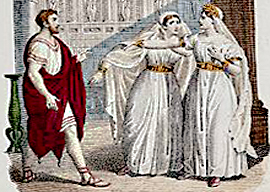
October 01, 2016

Norma by Vincenzo Bellini - original cast
Source: Wikimedia Commons
It often seems to me that the first qualification for producers of operas these days is proneness to severe lapses of taste, a kind of epilepsy of the judgment, or even a complete absence of aesthetic common sense. Orgies, if not actually a compulsory element of any production, are at least very frequent, however inappropriate they may be to the story or production as a whole. It is as if the plots of operas are not sufficiently melodramatic without the addition of a little light pornography.
Another requirement for producers is that they should think themselves greater than composers, whom they believe to be in need of a boost from their own sublime creativity. Originality is their goal, not at the service of the work that they are producing, but at that of their own glory. An opera is nothing but an opportunity for a producer to demonstrate his genius.
I saw a production of Bellini’s Norma the other day. It was relayed to my local cinema from the Royal Opera, Covent Garden. No one could claim that Norma was a work of social realism, set as it is in the days of druidic Gaul. Its story line is simple: Norma is a druidic priestess who has illicitly had two children by the Roman proconsul, Pollione, who then falls in love with another druidic priestess, Adalgisa, causing Norma to want revenge. The Gauls, meanwhile, are oppressed by the Romans and are constantly on the verge of revolt. Norma, having let them down, jumps at the end into a flaming pyre, partly reconciled with Pollione. It is all very cathartic.
It is obvious that there is some room”indeed, necessity”for interpretation here. For most of us, druids are men dressed in long robes, chanting on the sides of rainy Welsh hills with unruly beards that imply immemorial wisdom and secret powers”a bit like the former Archbishop of Canterbury, Dr. Rowan Williams. Our concept of female druids is hazier. They tend in our minds to be dressed in white satin drapery with leaves in their waist-long hair. In short, druids are ridiculous, even for opera.
Now, in this production, by the Catalan producer Ãlex Ollé, the Gauls are clearly soldiers of Franco who some of the time wear fascistic uniforms (fascist uniforms are almost as necessary to modern productions as orgies) and at others the sanbenitos of the Spanish Inquisition and popular Spanish religious processions.
At the same time, the Gauls remain oppressed by the occupying Romans and seek their national liberation. Are we to take in, then, that the producer believes that Franco liberated Spain, that he is a Catalan supporter of Franco’s opposition to Catalan nationalism? This seems unlikely, given that the producer’s theater group has been described as “a kind of adult adventure playground of fun, danger, slapstick and fantasy,” not exactly the first things, mostly, that you think of when you think of Franco. It is all very confusing.
It is possible that the producer was trying to say that, like occupying powers, national liberation movements usually end up oppressing their own populations, though in a different way”which, of course, is certainly true in very many cases. But again, I find it difficult to believe that this was what was in his mind. Sometimes confusion is just that: confusion.
This was a production for a multitasking age, when people are assumed to be unable to fix their minds on one thing at a time. In the first place, there was a lot of stage business during the overture, as if the audience, a large proportion of whom were of the so-called cognitive elite, could not listen to a few minutes of music unaided by visual stimulation. And this, it seems to me, was a mistake: It entailed the complete loss of that dramatic moment when the curtain rises at the end of the musical prelude.